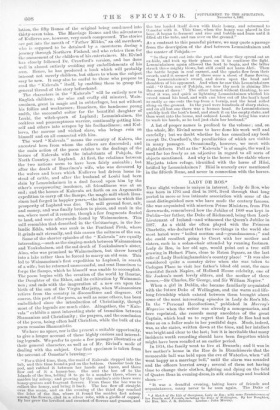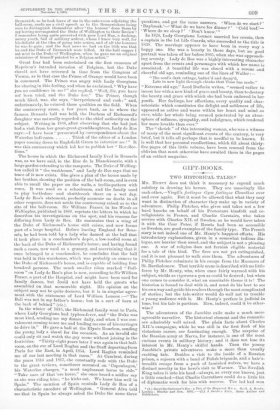LADY DE ROS.* THIS slight volume is unique in interest.
Lady de Ros, who was born in 1795 and died in 1891, lived through that long period in more or less intimate association with some of the most distinguished men who have made the century famous. She was acquainted with nineteen Prime Ministers, from Pitt downwards, remembered how the Jubilee of 1809 was kept in Dublin—her father, the Duke of Richmond, being then Lord- Lieutenant of Ireland—and witnessed the Queen's Jubilee in the non. Mrs. J. R. Swinton. London : John Murray. 1887. As a child she often played with the Princess Charlotte, who declared that the two things in the world she most hated were "boiled mutton and—grandmamma ;" and she could recollect going to Court with her mother and sisters, each in a sedan-chair attended by running footmen. Lady de Roe, in her old age, would point out a tree still growing in Hobart Place, close to Eaton Square, as the last relic of Lady Buckinghamshire's country place! "It was also considered quite a country drive when she was taken to Cadogan Place to visit her father's blind old aunt, the once beautiful Sarah Napier, of Holland House celebrity, one of Sir Joshua's most lovely sitters, and the mother of three heroes,—Sir Charles, Sir George, and Sir William Napier." When a girl in Dublin, she became familiarly acquainted with the future Duke of Wellington, and the warm and life- long friendship which existed between them brought about some of the most interesting episodes in Lady de Ros's life. In the " Personal Recollections," published in Murray's Magazine when the writer was already a nonogenarian, and here reprinted, she records many anecdotes of the great Captain, which lead us to regret that Lady de Ros had not done so on a fuller scale in her youthful days. Much, indeed, was, as she states, written down at the time, and ber intellect was bright and clear to the last; but it is inevitable that many incidents worth recording should have been forgotten which might have been recalled at an earlier period.
In 1814, the family went to live at Brussels; and it was in her mother's house in the Rue de la Blanchisserie that the memorable ball was held upon the eve of Waterloo, when "all went happy as a marriage bell," until the alarm was sounded and the officers hurried away ; several of them not having time to change their clothes, fighting and dying on the field of Quatre Bras in evening-dress, in silk stockings and buckled shoes :— " It was a dreadful evening, taking leave of friends and acquaintances, many never to be seen again. Tho Duke of Brunswick, as he took leave of me in the ante-room adjoining the ball-room, made me a civil speech as to the Brunswickers being sure to distinguish themselves after the honour' done them by my having accompanied the Duke of Wellington to their Review ! I remember being quite provoked with poor Lord Hay, a dashing, merry youth, full of military ardour, whom I knew very well, for his delight at the idea of going into action, and of all the honours he was to gain •, and the first news we had on the 16th was that he and the Duke of Brunswick were killed. At the ball supper I sat next to the Duke of Wellington, when he gave me an original miniature of himself painted by a Belgian artist."
Great fear bad been entertained on the first rumours of Napoleon's intended invasion of Belgium, lest the Duke should not have returned in time from the Congress of Vienna, as in that case the Prince of Orange would have been in command. The Prince was angry with Lady Georgiana for sharing in this feeling, and when he exclaimed, " Why have you no confidence in me?" she replied, "Well, Sir, you have not been tried, and the Duke has." The Prince, though much liked, was, she says, "inexperienced and rash ; " and, unfortunately, he evinced those qualities on the field. When the controversy arose, a few years back, as to where the famous Brussels ball was held, the Duchess of Richmond's daughter was naturally regarded as the chief authority on the subject. Writing in 1838, after observing that she had just had a visit from her great-great-granddaughters, Lady de Ros says :—I have been persecuted by correspondence about the Waterloo ball-room Think of the editor of a London paper corning down to Englefield Green to interview me! " It was this controversy which led her to publish her " RecAlec- tions."
The house in which the Richmond family lived in Brussels was, as we have said, in the Rue de la Blanchisserie, with a large garden extending to the ramparts. The Duke of Welling- ton called it " the washhouse," and Lady de Ros says that no trace of it now exists. She gives a plan of the house made by her brother, showing the position of the ball-room, and is even able to recall the paper on the walls, a trellis-pattern with roses. It was used as a schoolroom, and the family used to play battledore and shuttlecock there on a wet day.
Lady de Roe's statement, perfectly accurate no doubt in all other respects, does not settle the controversy raised as to the site of the ball-room. Sir William Fraser, in his Words on Wellington, published in 1889, reprints the letters in which he describes his investigations on the spot, and his reasons for differing from Lady de Ros. He maintains that a wing of the Duke of Richmond's house still exists, and now forms part of a large hospital. Before leaving England for Brus- sels, he had been told by a lady who danced at the ball that it took place in a coachmaker's dep6t, a low-roofed room at the back of the Duke of Richmond's house ; and having found such a room, now used as a granary, and ascertaining that it once belonged to a coachmaker, he concludes that the ball was held in this warehouse, which was probably an annexe to the Make of Richmond's house, and is capable of holding four hundred persons. The much smaller room marked " Ball- room " on Lady de Roe's plan is now, according to Sir William Fraser, a part of the Hospital, and might have been used for family dances, but Could not have held the guests who assembled on that memorable night. His opinion on the subject may not be quite decisive, but it is in singular agree- ment with the statement of Lord William Lennox :—" The Ball was not in my father's house; but in a sort of barn at the back of behind" (sic.).
In the winter of 1815, the Richmond family went to Paris, where Lady Georgians had typhus-fever, and " the Duke was most kind, sending me my dinner daily, and when I was con- valescent coming to see me and lending me one of his carriages to drive in." He gave a ball at the Elysee Bourbon, sending the young lady a shawl for the occasion. As an invalid she could only sit and watch the gay scene without joining in the festivities. "Thirty-eight years later I was again in that ball- room, on the eve of Lord Raglan and the Staff departing from Paris for the East, in April, 1854. Lord Raglan reminded me of our last meeting in that room." At Cambrai, during the years 1810 and 1817, she constantly rode with the Duke to the great reviews, sometimes mounted on ' Copenhagen,' his Waterloo charger, "a most unpleasant horse to ride." "Take care of that 'ere horse," she once heard a soldier say as she was riding him; "he kicks out. We knew him well in Spain." The mention of Spain reminds Lady de Roe of a characteristic anecdote of Wellington. " General Alva told me that in Spain he always asked the Duke the same three questions, and got the same answers. When do we start P Daybreak.'—' What do we have for dinner P' Cold beef:— Where do we sleep?" Don't know.'" In 1824, Lady Georgiana Lennox married her cousin, then a captain in the let Life Guards, who succeeded to the title in 1839. The marriage appears to have been in every way a happy one. She was a beauty in those days, but no good portrait was taken of her before 1865, when she was approach- ing seventy. Lady do Ros was a highly interesting character apart from the events and personages with which her name is associated. A beautiful life was closed with a serene and cheerful old ago, reminding one of the lines of Waller :— " The soul's dark cottage, batter'd and decay'd,
Lets in new light through chinks that Time has made." "Extreme old age," Lord Dufferin writes, "seemed rather to invest her with a new kind of grace and beauty, than to destroy the beauty and grace with which she had been endowed in her youth. Her feelings, her affections, every quality and char- acteristic which constitutes the delight and nobleness of life, appeared as active and warm within her heart and mind as ever, while her whole being seemed penetrated by an atmo- sphere of softness, sympathy, and indulgence, which rendered her more lovable than ever."
The "sketch " of this interesting woman, who was a witness of many of the most significant events of the century, is very brief, but it tells all perhaps that is needful to be known. It is well that her personal recollections, which fill about thirty- five pages of this little volume, have been rescued from the oblivion that must otherwise have awaited them in the pages of an extinct magazine.





















































 Previous page
Previous page